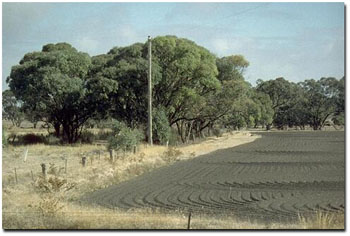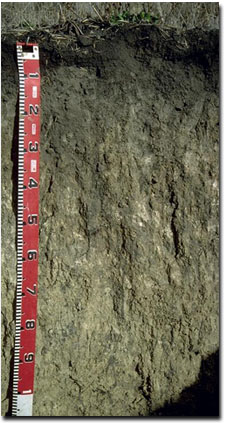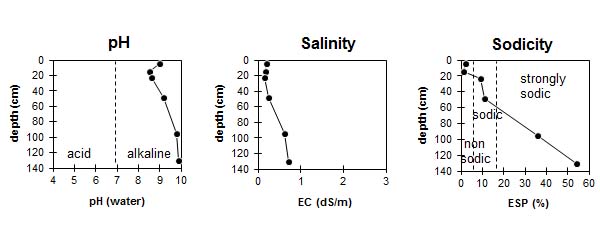Site LS20
Location: Woorak
Australian Soil Classification: Epicalcareous-Epihypersodic, Self-mulching, Grey VERTOSOL
Northcote Factual Key: Ug 5.24
Great Soil Group: grey clay
General Landscape Description: Level plain between north-south trending rises. Gilgai microrelief apparent.
Native Vegetation: Black Box (Eucalyptus largiflorens) and Lignum Bush (Muehlenbeckia cunninghamii) occur in undisturbed areas.
 LS20 Landscape |
Soil Profile Morphology:
Surface Soil
| A11 | 0-10 cm | Dark grey (10YR4/1); light clay; self mulching; pH 9.0: |  LS20 Profile |
| A12 | 10-20 cm | Very dark grey (10YR3/1); light medium clay; strong very fine blocky structure; firm consistence (dry); pH 8.5: | |
| A2 | 20-25 cm | Dark greyish brown (10YR4/2) sporadically bleached; light medium clay; weakly structured; firm consistence (dry); pH 8.6: | |
| Subsoil | |||
| B21k | 25-70 cm | Light brownish grey (10YR6/2) with reddish yellow (7.5YR7/6) mottles; medium heavy clay; strong medium prismatic, parting to moderate medium blocky structure; strong consistence (dry); contains a common (10 - 20%) amount of soft calcium carbonate; pH 9.2: | |
| B22 | 70-120 cm | Light grey (2.5Y7/2); medium heavy clay; strong medium prismatic, parting to moderate medium blocky structure; very firm consistence (moist); contains infill from surface horizons between prismatic structure; pH 9.8: | |
| B23 | 120+ cm | Light grey (2.5Y7/2); medium heavy clay; moderate coarse lenticular, parting to finer lenticular structure; firm consistence (moist); pH 9.9. | |
- Clay texture throughout the profile.
- Strongly cracking when dry.
- Self-mulching surface horizon.
- Zone of carbonate accumulation occurs from the top of the subsoil (ie. hypercalcic).
Soil Profile Characteristics:
pH | Salinity | |||
Surface (A1 horizon) | Moderately Alkaline | Low | Non-Sodic | Slaking, No Dispersion |
Subsoil (B21 horizon) | Very Strongly Alkaline | Low | Sodic | None1 |
Deeper Subsoil (at 1 metre) | Extremely Alkaline | Low | Strongly Sodic | None1 |

| The surface soil is moderately alkaline. The subsoil is very strongly alkaline becoming extremely alkaline at depth. | The salinity rating is low throughout the profile. | The surface is non-sodic. The subsoil is sodic becoming strongly sodic at depth. |
Management Considerations:
Whole Profile
- The soil is strongly alkaline throughout which indicates that nutrients such as iron, manganese, copper and zinc may be poorly available to plants.
Surface (A) Horizon
- The self-mulching surface soil will provide a good seed bed that is friable and easily worked.
- The inherent fertility of the surface soil (based on the sum of the exchangeable basic cations) is very high.
- Clay surface horizons with high wilting points mean that plants will not be able to fully utilise light rains when soil is relatively dry.
- Tillage of clay soils should be avoided if the soil is wet (ie. wetter than the plastic limit). At such a moisture condition, tillage or excessive trafficking or overstocking can result in soil structural damage (e.g. compaction, smearing occurring). Ideally, tillage and trafficking should take place when the soil is drier than the plastic limit, down to at least the tillage depth.
- When the soil is dry, heavy rains will move down soil cracks. This rapid recharge can be valuable for the survival of plants near wilting. When wet, the soil will swell and further infiltration of water will be relatively slow. The presence of a sporadically bleached subsurface (A2) horizon indicates that some restriction in water movement may occur at the A/B interface.
Subsoil (B) Horizons
- The upper subsoil horizon is sodic and likely to restrict water and root movement. Dispersion, however, does not occur and may be due in part to calcium being the dominant exchangeable cation.
Comments from Landholder:
- Good cropping soil but not suitable for continuous cereal cropping.
- Phosphorus and nitrogen has been applied.
- Gypsum used successfully.
- Fallow/wheat/peas/canola rotation has been used.


